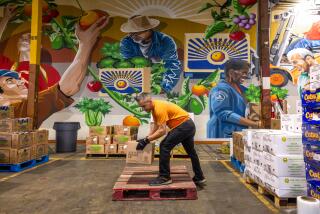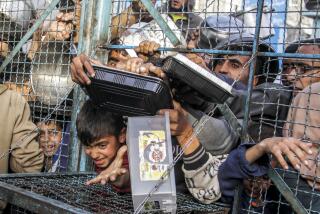Yeltsin’s Heroes Now Fighting to Save Harvest
- Share via
SAVYOLOVO, Soviet Union — In just a few weeks, Boris Teselkin, a soft-spoken captain in the Red Army’s Taman Division, has gone from protecting a Russian president--and helping to make history--to pulling up cabbages from the mud.
But for Teselkin and thousands of his military colleagues, putting food on the Russian table this winter may now be just as important to their nation’s future as protecting the life of Boris N. Yeltsin.
Six weeks ago, Teselkin wheeled his tank across the Kalinin Bridge in downtown Moscow, toward Yeltsin’s headquarters--and into history.
After his division was called to Moscow in a show of force by the coup plotters, Teselkin and his unit switched sides, with their six tanks lined up before the “White House” to protect the Russian president. It was Teselkin’s tank that Yeltsin clambered onto to read his defiant address to the world, denouncing the August coup.
“Yeltsin came up to me and said: ‘Do you come here to kill Yeltsin?’ ” Teselkin recalls matter-of-factly. “I said, ‘No, of course not.’ ‘
Today, Teselkin and his unit, heroes of the second Russian Revolution, are picking cabbages on a state farm 60 miles north of Moscow, up to their knees in the autumn mud. Along with thousands of other Soviet army troops, the Taman Division has been ordered into the nation’s deserted farm fields to do what the country’s shattered agricultural system cannot do for itself: Bring in the harvest.
In the aftermath of the political frenzy of the last few weeks, a grim realization is setting in here--that the nation now faces winter without a properly functioning farm economy or food distribution system.
Often, the problem is labor. While some farms are overloaded with too many workers, other Soviet state farms are virtually deserted; the workers have left for the city.
“People vanish,” shrugs Vladimir Ignatkov, deputy chairman of the Agricultural Ministry for the Dmitrov region north of Moscow, which includes the small farming village of Savyolovo. “So if we didn’t call in the soldiers, we would bring in maybe just 20% of the crop.”
Adds Teselkin as he watches his men toss cabbages into an open truck for transport to Moscow: “If we weren’t here, probably the cabbages and potatoes would be left under the snow.”
Deeply concerned about the political consequences of severe food shortages or even famine this winter, the Russian Federation--to a greater degree this fall than ever before in recent history--is relying on regular army troops to harvest the country’s cabbage, potato and other vegetable crops. The Taman Division, for example, has been out in the field handling the harvest since the beginning of September; they came to the Dmitrov farm just days after they left Moscow after the coup’s collapse.
“We just went from Moscow back to our garrison, washed off our tanks and armored personnel carriers and then we were ordered out here right away,” Teselkin says. Now, in the Dmitrov region alone, 4,000 soldiers are bringing in crops on 17 huge state farms--almost exclusively by hand, as migrant workers in the United States would do.
“We have many more soldiers than we have ever had before here,” acknowledges Alexandra Shelagina, a deputy in the Dmitrov agricultural office.
Each day, the troops are joined by a rotating crew of 2,000 local factory workers--but not by any regular farm workers.
“There are no farmers, just soldiers,” complained Capt. Alexei Bezrukov, a Taman Division political officer who helps oversee the division’s farm work in the Dmitrov region. “We have got so few farmers that we have to be here to save the crop.”
Still, for the officers and men of a proud showcase army unit like Taman--which is roughly equivalent to the U.S. 82nd Airborne Division in terms of prestige in the Soviet military--being reduced to the status of migrant farm labor provides one more humiliating reminder of just how distorted the Soviet system has become.
“I don’t think that it is right for us to do this,” complained Sergei Sadin, a tall, athletic young Taman paratrooper as he took a break from the fields. “The army should do its real business.”
Adds Teselkin: “We are fulfilling or duty here, just as we did in Moscow. But an army should be an army.”
Yet for many Taman soldiers, who now face even tougher economic hardships than most Soviet civilians, the time out in the field can be a welcome change. That is mainly because, for the first time ever, the soldiers are getting paid extra money by the local agricultural agency to bring in the harvest.
In other seasons, when army units were used in smaller numbers to help on the farms, they just received their standard army pay--which now totals 50 rubles per month for enlisted men. (That is about $30 a month at the commercial exchange rate.) As a result, the troops refused to work hard in the fields and often left much of the crop damaged or spoiled on the ground.
But Soviet agricultural officials are so desperate to bring in the crops this fall that they have offered soldiers 25 rubles a day--atop their monthly army wages--if they meet a daily quota for potatoes and cabbages. About 25 rubles--given the runaway inflation in the Soviet Union--can only buy about one pack of cigarettes. But it is still enough to get the soldiers to work.
The farm work also gives the soldiers a much-needed break from the stifling discipline of Red Army barracks life; in the fields, several enlisted men said, they are largely left alone by their officers.
But even as their troops bring in the harvest, the Taman Division officers are growing increasingly frustrated by the waste they see in the storage and distribution system that their harvest must go through after leaving the fields. Many of the potatoes and cabbages from the Dmitrov region are shipped to Moscow by civilian agencies, which then store them in the city in large warehouses.
“I have seen where they take the food and these warehouses are absolutely filthy,” says Capt. Bezrukov. “There is no problem here on the farm, we are not losing much here. But it is being wasted in these storage places.”
More to Read
Sign up for Essential California
The most important California stories and recommendations in your inbox every morning.
You may occasionally receive promotional content from the Los Angeles Times.












